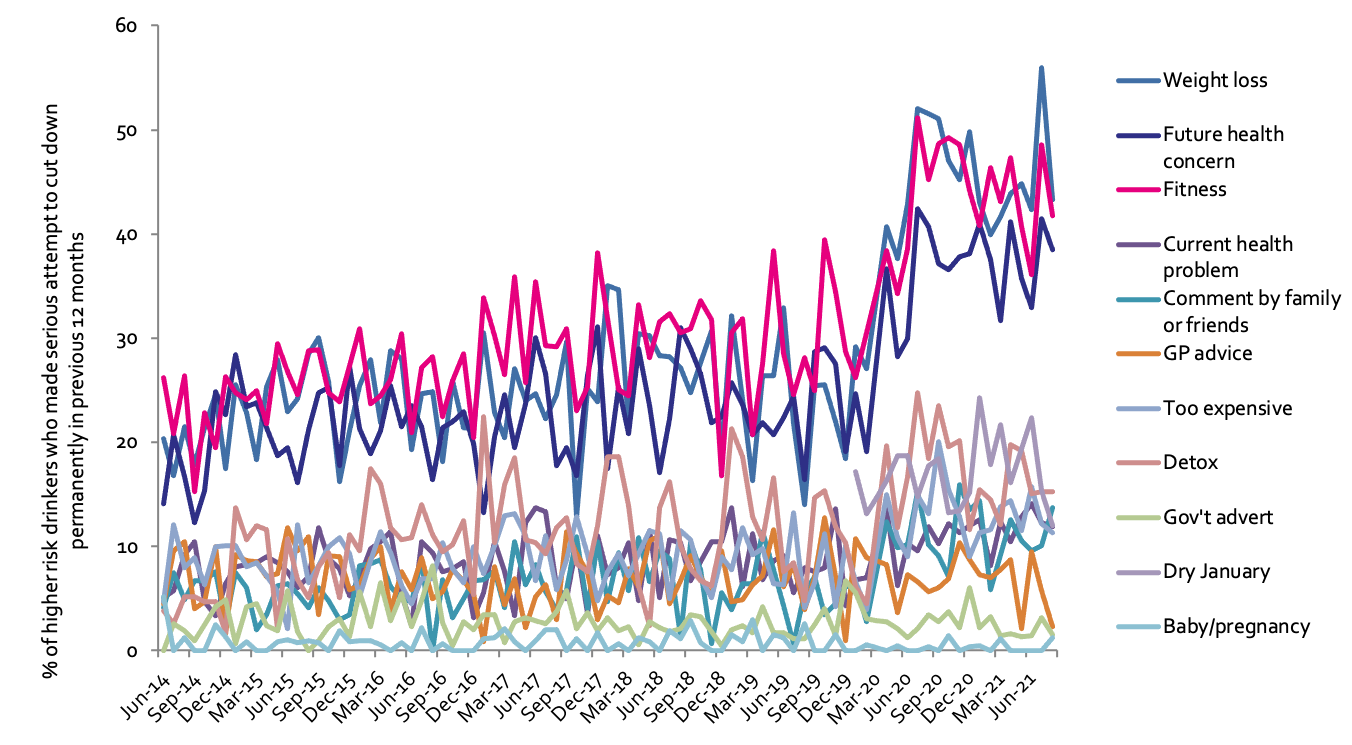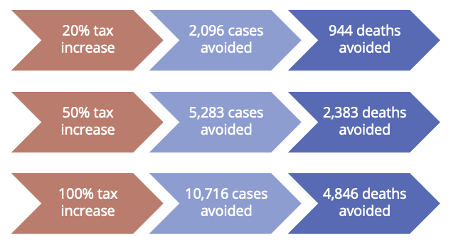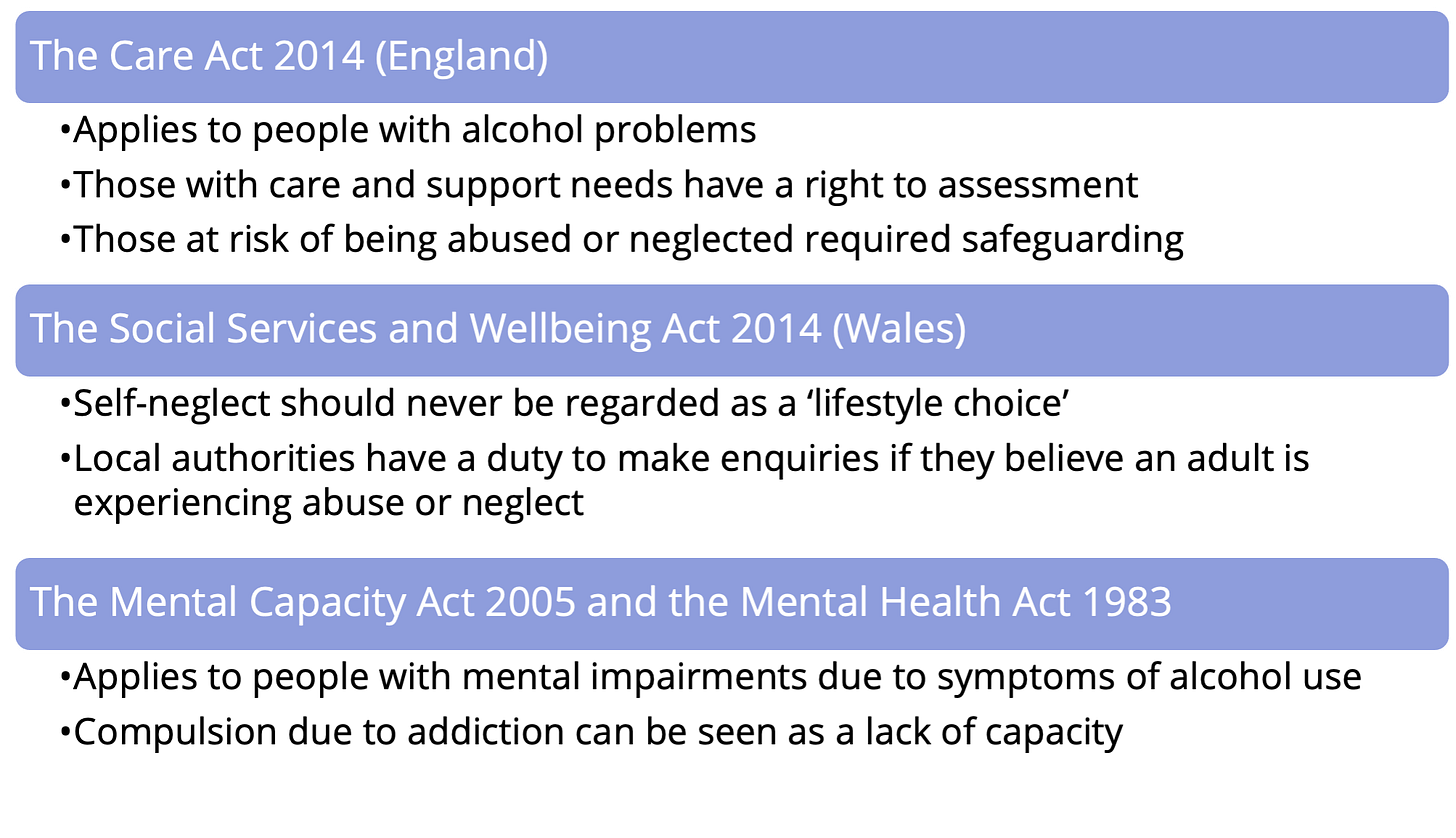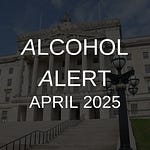Hello and welcome to the Alcohol Alert, brought to you by The Institute of Alcohol Studies.
In this edition:
Study finds alcohol ads appeared every 12 seconds in England vs. Scotland 2020 Six Nations match and responsible drinking messages were barely visible 🎵 Podcast feature 🎵
The Scottish Government launches its 2021-2022 Programme for Government
Serious injuries from drink-driving road traffic accidents are at their highest point since 2008
YouGov survey shows public support for restricting alcohol advertising
Study shows doubling alcohol taxes could save 4,850 Europeans from cancer deaths each year
Alcohol Change UK publishes a report on how to use legal powers to safeguard vulnerable dependent drinkers
Nicola Sturgeon calls for perseverance and determination against industry opposition to pricing policies
Public Health England publishes review on gambling-related harms
Lords debated the Police, Crime, Sentencing and Courts Bill
We hope you enjoy our roundup of stories below: please feel free to share. Thank you.
Upcoming events
The Global Alcohol Policy Alliance is running a 3-day virtual event in place of their annual conference, from 12-14 October 2021.
Each day there will be a session with a key-note speaker, followed by a session with comments from a panel of regional representatives and Q&As.
The event will cover:
See more information and register for the event here.
This month’s IAS blogs
Alcohol Toolkit Study: quarterly update
The Alcohol Toolkit Study is run by University College London and tracks the latest trends in alcohol consumption in England on a quarterly basis. We will include the recent data in our Alert each quarter when it is released.
For more information and data graphs please visit their website here.
Prevalence of increasing and higher risk drinking (AUDIT)
Increasing and higher risk drinking defined as those scoring >7 AUDIT. A-C1: Professional to clerical occupation C2-E: Manual occupation
Currently trying to restrict consumption
A-C1: Professional to clerical occupation C2-E: Manual occupation; Question: Are you currently trying to restrict your alcohol consumption e.g. by drinking less, choosing lower strength alcohol or using smaller glasses? Are you currently trying to restrict your alcohol consumption e.g. by drinking less, choosing lower strength alcohol or using smaller glasses?
Triggers for past-year attempts to cut down
Question: Which of the following, if any, do you think contributed to you making the most recent attempt to restrict your alcohol consumption?
Study finds alcohol ads appeared every 12 seconds in England vs. Scotland 2020 Six Nations match
A new study highlights the prevalence of alcohol advertising in the Guinness Six Nations Rugby Championship and subsequent risk to children, with adverts appearing hundreds of times throughout matches.
Researchers at the University of Stirling found 961 references in the Scotland vs. England match and 754 in the Ireland vs. Wales match: every 12 and 15 seconds respectively.
On Thursday 30th September we held a webinar to launch the findings of the study and to discuss policy implications across different countries of the UK. The research was sponsored by IAS, Scottish Health Action on Alcohol Problems (SHAAP) and Alcohol Action Ireland (AAI).
During the presentation study author Dr Richard Purves showed that ‘responsible drinking’ messages were only visible in 0.4% of the alcohol references during the England vs. Scotland match.
Despite this, the Portman Group – the alcohol industry’s social responsibility body – responded that “socially responsible sponsorship is needed more than ever before”, going on to say that banning alcohol ads in sport would have no “tangible effect on public health”.
Previous research has shown that children exposed to alcohol advertising are more likely to start drinking at a younger age, and drink more heavily in later life. This new study adds to a wealth of information showing the failings of alcohol marketing regulations, particularly in sport.
As part of Portman’s regulatory code, “drinks companies must use their reasonable endeavours…to ensure that at least 75% [of the audience] are aged over 18”. Dr Katherine Severi, Chief Executive of the Institute of Alcohol Studies argues that:
“This is slightly meaningless posturing when the Six Nations has an audience of 125 million. Under these rules it is permitted for over 30 million children to see and be influenced by alcohol ads.”
In the presentation Dr Purves and co-author Dr Nathan Critchlow discussed Ireland’s impending alcohol marketing restrictions, which are set to come in in November 2021, asking “how Ireland’s impending restrictions may influence alcohol marketing practice in future iterations of the tournament?”.
They spoke about how the alcohol industry has worked to circumvent marketing restrictions in France with so-called ‘alibi marketing’: using features that are linked to the brand without explicitly referring to it – a practice that has been used by tobacco companies in sport too. In France, the Six Nations’ lead sponsor, Guinness, uses the term ‘Greatness’ instead – with the same branding.
The study found that this occurs in France matches despite alibi marketing appearing to be against the French regulations, which prohibit “advertising [that] by its design, use of a name, trademark, advertising emblem or other distinctive sign, recalls an alcoholic beverage”.
Dr Purves and Dr Critchlow’s study highlights the continued presence of alcohol marketing in France and its implications for Ireland’s restrictions:
“The continued presence of alibi marketing in France does have implications for the regulators and policymakers overseeing the new restrictions in Ireland, namely whether alibi marketing will also be restricted under the wording of their legislation and what arrangements are in place to monitor and enforce the restrictions.”
Dr Sheila Gilheany, Chief Executive of AAI said:
“This is a great opportunity for Ireland to implement a public health policy that will reduce alcohol advertising exposure to children. As this report highlights, the Irish Government and public health officials need to be wary of the current loopholes we see in the French approach, and ensure our regulations protect against this.”
Please see below or on our YouTube channel for the full webinar:
Scottish Government launches its 2021-2022 Programme for Government
The Scottish Government released its Programme for Government on 7 September, which lays out its plan for the next year, with this year’s focus on a ‘Fairer, Greener Scotland’.
In Chapter 1 of the programme, entitled ‘A Caring Society’, the government unveils its new vision for health and social care, including:
Plans to take forward its NHS Recovery Plan to increase capacity and address backlogs in treatment
Establishing the new National Care Service
Providing the first £50million of a planned £250million investment to tackle drug deaths
The National Care Service will be tasked with handling alcohol and drug services and the programme says Scotland will “continue to lead the way with bold population-wide approaches to reduce the significant disproportionate harms of tobacco, alcohol and unhealthy diets, and to inspire healthy behaviours and lifestyles”.
This will include driving forward with their Alcohol Framework 2018, which contains a number of actions to reduce alcohol harm and “embeds the World Health Organization's focus on tackling the affordability, availability and attractiveness of alcohol”.
Specific actions include monitoring the effect of minimum unit pricing, improving alcohol labelling information, consulting on advertising restrictions in 2022, and raising awareness of the links between alcohol and cancer.
Serious injuries from drink-driving road traffic accidents at highest point since 2008
The Department for Transport released data on drink-driving accidents and casualties in 2019, which show continued stagnation of fatalities and a rise in serious injuries.
2009-2010 saw a significant drop in the number of people killed in drink-driving accidents. However since then, the numbers have plateaued around 230 deaths, as the following graph shows. 230 deaths equates to 13% of the total road traffic deaths in 2019.
Department for Transport: Fatalities in reported drink-drive accidents: GB, 2009 to 2019
Serious injuries on the other hand, rose significantly from 1,370 to 1,580 – a 15% rise. Serious injuries include fractures, internal injuries, crushings, severe cuts, or injuries that cause death 30 or more days after the accident.
In terms of sex, males were much more likely to be involved in drink-driving accidents, including being more likely to be a casualty in such accidents.
Media coverage of the report quoted RAC’s head of policy Nicholas Lyes (RAC is a British automotive services company), who said:
“While there will be much interest in the 2020 casualty figures when they come out to understand the impact of the Covid lockdowns on drink-driving, these figures still represent a rather chilling reminder that in the region of 250 people are killed by drink-drivers on Great Britain’s roads every year, a figure that’s barely fallen since 2010”.
A report at the beginning of 2021 by the Parliamentary Advisory Council for Transport Safety (PACTS) made a number of clear recommendations to combat drink-driving casualties, including:
The 2020 provisional road casualty statistics were released in June this year and show a significant decrease in deaths and other casualties, likely due to travel restrictions in place during coronavirus lockdowns.
In February 2022 the drink-driving casualty statistics will be released for 2020.
What does the public think about restricting alcohol advertising?
A policy that alcohol harm groups and the World Health Organization frequently table is restricting alcohol marketing, with focus primarily being on the danger to children being exposed to so much of this marketing.
Less is spoken about the public perception of alcohol marketing and whether they support restrictions.
Research by YouGov, conducted on behalf of the campaign group Action on Smoking and Health, asked the British public whether they would support measures to limit the exposure of children and young people to alcohol advertising.
The poll of over 12,000 people found that:
With the UK Government banning the online and pre-9pm TV advertising of high fat, sugar and salt foods from 2023, health groups argue that alcohol should be included within these controls.
Professor Sir Ian Gilmore, Chair of the Alcohol Health Alliance, said:
“We are constantly bombarded with alcohol advertising both online and in the real world – and so are our children. Studies show that the more young people are exposed to alcohol marketing, the more likely they are to start drinking at an earlier age.
“The Government has taken a great step forward for public health by stopping junk food advertising online and introducing other limits to its promotion. If alcohol is not included in those plans, we risk alcohol advertising filling the void that is left behind. The public want to see more done to limit young people’s exposure to alcohol advertising.”
Doubling alcohol taxes could save 4,850 Europeans from cancer deaths each year
A modelling study in the Lancet looked at how many cancer cases and deaths would be avoided by increasing alcohol excise duties for beer, wine, and spirits in the World Health Organization’s European Region in 2020.
The study modelled increases of 20%, 50%, and 100% and assumed that these increases would be passed down to the customer and not absorbed by the producer.
In 2019 there were an estimated 180,887 cancer cases and 85,130 cancer deaths caused by alcohol.
The highest number of new cancer cases and deaths that could have been avoided were for breast and colorectal cancers.
The study authors argue that “Breast cancer takes on a particularly important role, as the risk is sharply increased even with small daily amounts of pure alcohol. About half of alcohol-attributable breast cancer cases in the EU are caused by light to moderate alcohol consumption.”
Proportion of new alcohol-attributable cancer cases that would have been avoided by cancer site and tax increase
“While a 100% increase in excise duty may appear to be unrealistically high, a doubling of current excise duties in most countries would still keep tax rates, particularly for beer and wine, below those in Finland, which was selected as good practice example in the sensitivity analysis. We believe that our findings are important in informing the public as well as policy makers about the cancer risk posed by alcohol, empowering them to make informed decisions about their individual consumption and alcohol policies, respectively.”
How to use legal powers to safeguard vulnerable dependent drinkers
Alcohol Change UK has developed a detailed guide for practitioners on how to use legal powers to improve the wellbeing and safety of adults who are highly vulnerable, chronic, dependent drinkers.
The legal powers the report focuses on are below, with examples of actions that can be taken under these powers:
It also discusses other relevant powers, such as the 2014 Anti-social Behaviour Act and the 1998 Human Rights Act
Alongside the central focus on legislation, it emphasises the importance of having systems and processes in place that enable the powers to be used most effectively. It also addresses the myths and misconceptions that hinder work with this group, and challenges the idea that this client group are choosing to live chaotic lives.
For instance it challenges the statement “If someone says they don’t have a problem and doesn’t want help, there is nothing we can do”, by stating that if someone is being exploited, neglected, or self-neglected then consent is not required to raise an adult safeguarding concern. At that point the local authority needs to determine what action is required.
Alcohol Change UK runs a half-day training course on how to use these legal powers, which is available at a cost. Find out more.
Nicola Sturgeon calls for perseverance and determination against industry opposition to pricing policies
Scotland’s First Minister Nicola Sturgeon spoke at the World Health Organization’s 71st Regional Committee for Europe on 16 September and was asked what messages she could give to others regarding Scotland’s battle to implement minimum unit pricing (MUP).
After introducing the rationale for bringing in MUP – due to the severe health challenge Scotland faced and still faces regarding alcohol harm – the First Minister said that MUP was introduced as other pricing policies, such as excise taxes, could only be decided by the Westminster Government.
Ms Sturgeon stated that after many years of legal battles with the alcohol industry, the Scottish Government “eventually prevailed” and the country very quickly saw the positive impact with a reduction in alcohol deaths.
In terms of messages to other countries, Ms Sturgeon said that firstly you have to:
“Recognise clearly and explicitly that an alcohol strategy won’t be as effective without a pricing policy. Secondly governments need to be prepared to be determined and persevere, as the alcohol industry will resist any innovative measures like this. And thirdly to make sure you build a strong evidence base in order to persevere”.
She concluded by saying that she’s more convinced than ever that MUP is a really effective tool in reducing alcohol harm and that countries need to learn from each other’s experiences and lessons learnt, and “turn aspirations into action”.
Ms Sturgeon’s 8-minute section can be found from 19:50 below:
Public Health England (PHE) publishes review on gambling-related harms
On 30 September PHE published a review that looked at the prevalence of gambling and gambling harm, determinants of harm, and the social and economic burden of gambling.
The key findings of the review were:
Rosanna O’Connor, Director of Alcohol, Drugs, Tobacco and Justice at PHE, said:
“The evidence is clear – harmful gambling is a public health issue and needs addressing on many fronts, with an emphasis on preventing these harms from occurring as well as with help readily accessible for those directly and indirectly affected by the wide ranging and long-lasting negative impacts of gambling.”
Lords debate the Police, Crime, Sentencing and Courts Bill
The House of Lords discussed drink driving in their debate on the new Police and Crime Bill on 14 September.
Baroness Williams of Trafford (Minister of State, Home Office) introduced the debate and said:
“The sentencing measures in the Bill will target the most serious violent and sexual offenders and those who pose the greatest threat to the public. That includes those who commit the premeditated murder of a child, those who kill through dangerous driving or careless driving under the influence of alcohol and drugs, and those who become more dangerous while in prison.”
Labour peer Lord Brooke of Alverthorpe argued that we should reduce the drink drive limit in England and Wales to 50mg as we have plateaued in reducing deaths since 2010. He said he’ll be bringing an amendment on reducing the limit, “backed by appropriate enforcement and provision of alternative transport choices”.
This comes after a recent study that showed Scotland’s reduction of its drink drive limit has not reduced road traffic incidents. The authors of the study, who wrote an IAS blog on the subject, said that part of the reason for the lack of impact was that there was no increase in alternative means of transport and there was low enforcement. Therefore if other home nations are to consider reducing their limits, there are additional policies that may need to be implemented.
Additional studies published this month
The UK Alcohol Alert (incorporating Alliance News) is designed and produced by The Institute of Alcohol Studies. Please click the image below to visit our website and find out more about us and what we do, or the ‘Contact us’ button. Thank you.





























